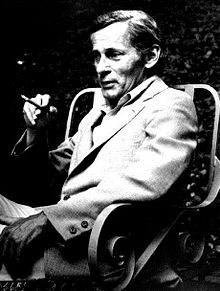William Gaddis
| |||||||||||||||||||||||||
Read other articles:

1968 film by K. S. Gopalakrishnan Panama PasamaTheatrical release posterDirected byK. S. GopalakrishnanScreenplay byK. S. GopalakrishnanStory byG. BalasubramaniamProduced byBaluStarringGemini GanesanB. Saroja DeviCinematographyR. SampathEdited byR. DevarajanMusic byK. V. MahadevanProductioncompanyRavi ProductionsRelease date 23 February 1968 (1968-02-23) Running time162 minutesCountryIndiaLanguageTamil Panama Pasama (transl. Money or Affection?) is a 1968 Indian Tamil-lan...
Den här artikeln har skapats av Lsjbot, ett program (en robot) för automatisk redigering. (2013-08)Artikeln kan innehålla fakta- eller språkfel, eller ett märkligt urval av fakta, källor eller bilder. Mallen kan avlägsnas efter en kontroll av innehållet (vidare information) Venturia pulsatorSystematikDomänEukaryoterEukaryotaRikeDjurAnimaliaStamLeddjurArthropodaUnderstamSexfotingarHexapodaKlassEgentliga insekterInsectaOrdningSteklarHymenopteraÖverfamiljIchneumonoideaFamiljBrokparasit...

Funiculaire de la Madonna del Sasso à Locarno La Suisse, pays au relief tourmenté, possède un grand nombre de funiculaires, moyen de transport idéal pour vaincre de fortes déclivités. Historique Le premier funiculaire de Suisse entra en service le 16 mars 1877 entre Lausanne et Ouchy. Par la suite, le L-O, surnommé la « Ficelle », a d'abord été converti en chemin de fer à crémaillère (13.04.1958), puis en métro automatique m2 (27.10.2008). En 2017, le plus ancien funi...

Pour les articles homonymes, voir Bard. Bard-lès-Époisses Mairie de Bard-lès-Époisses. Administration Pays France Région Bourgogne-Franche-Comté Département Côte-d'Or Arrondissement Montbard Intercommunalité Communauté de communes des Terres d'Auxois Maire Mandat Jean-Michel Massé 2020-2026 Code postal 21460 Code commune 21047 Démographie Populationmunicipale 69 hab. (2020 ) Densité 19 hab./km2 Géographie Coordonnées 47° 31′ 56″ nord, 4° 13�...

Artikel atau sebagian dari artikel ini mungkin diterjemahkan dari infusion di en.wikipedia.org. Isinya masih belum akurat, karena bagian yang diterjemahkan masih perlu diperhalus dan disempurnakan. Jika Anda menguasai bahasa aslinya, harap pertimbangkan untuk menelusuri referensinya dan menyempurnakan terjemahan ini. Anda juga dapat ikut bergotong royong pada ProyekWiki Perbaikan Terjemahan. (Pesan ini dapat dihapus jika terjemahan dirasa sudah cukup tepat. Lihat pula: panduan penerjemahan ar...

International reaction to the 2014 Crimean crisis according to official governmental statements.[nb 1] Statements only voicing concern or hope for peaceful resolution to the conflict Support for Ukrainian territorial integrity Condemnation of Russian actions Condemnation of Russian actions as a military intervention or invasion Support for Russian actions and/or condemnation of the Ukrainian interim government Rec...

У Вікіпедії є статті про інші значення цього терміна: Опинись у моїй шкірі. Опинись у моїй шкіріЖанр науково-фантастичний романАвтор Мішель ФейберМова англійськаОпубліковано 2000Країна ШотландіяВидавництво Harcourt[d] і Canongate BooksdISBN-13: 978-0-15-100626-7ISBN-10: 0-15-100626-1 «Опинись ...

Мазниця. Полтавська область Мазниця (зменшене — мазничка) — посудина для дьогтю, яким змазували рухомі металеві частини коліс, воріт, дверей і т. ін.[1] Зміст 1 У літературі 2 Див.також 3 Примітки 4 Джерела У літературі Така біла, як мазниця (М. Номис); Нате і мою мазничку на...

此条目的主題是元朗的橫洲。关于其他地方,請見「橫洲」。 横洲全貌(2017年) 横洲有不少棕地作業活動 從横洲漁塘望向天水圍新市鎮 從横洲丫髻山望向天水圍新市鎮 橫洲(英語:Wang Chau)是位於香港元朗區元朗市中心西北面的一個鄉村地區,傳統範圍包括朗屏邨及元朗創新園,西面毗連天水圍新市鎮。 横洲原指元朗舊墟西面一處瀕海的小山崗,其西北面與丫髻

North Greenwich PierTypeRiver bus and tourist/leisure servicesLocaleRiver Thames, London, EnglandOwnerLondon River ServicesOperatorUber Boat by Thames ClippersCharacteristicsHistoryCoordinates51°30′08″N 0°00′33″E / 51.502189°N 0.009056°E / 51.502189; 0.009056 North Greenwich Pier North Greenwich Pier is a pier on the River Thames, London, England. It is situated on the Greenwich Peninsula in south-east London, to the east of The O2. The pier was formerly na...

' تجمع بدو وادي حلوف - قرية - تقسيم إداري البلد اليمن المحافظة محافظة حضرموت المديرية مديرية تريم العزلة عزلة تريم السكان التعداد السكاني 2004 السكان 33 • الذكور 18 • الإناث 15 • عدد الأسر 4 • عدد المساكن 4 معلومات أخرى التوقيت توقيت اليمن (+3 غرينيتش)

Spiele der XXII. Olympiade Austragungsort: Moskau (Sowjetunion) Stadion: Olympiastadion Luschniki Eröffnungsfeier: 19. Juli 1980 Schlussfeier: 3. August 1980 Eröffnet durch: Leonid Breschnew (Staatsoberhaupt) Olympischer Eid: Nikolai Andrianow (Sportler)Alexander Medwed (Kampfrichter) Disziplinen: 27 (21 Sportarten) Wettkämpfe: 203 Länder: 80 Athleten: 5217 (4093 , 1124 ) ← Montreal 1976 Los Angeles 1984 → Medaillenspiegel Platz Land G S B Ges. 1 Sowjetunion 1955 Sowjetunion 80 6...

AM 0644-741AM 0644-741, Foto di ambil oleh Hubble. Sumber NASA/ESAData pengamatan (J2000 epos)Rasi bintangVolansAsensio rekta 6j 43m 6.1d[1]Deklinasi -74° 13′ 35″[1]Pergeseran merah6604 ± 26 km/s[1]Jarak300 MlyMagnitudo semu (V)+13.96[1]Ciri-ciriJenis(S0-) + Ring[1]Ukuran semu (V)1′.7[1]Penamaan lainSouthern Ellipse,[1] PGC 19481 AM 0644-741 adalah sebuah galaksi lentikular tak berbatang da...

Wang ChauTraditional Chinese橫洲Simplified Chinese横洲TranscriptionsStandard MandarinHanyu PinyinHéngzhōuYue: CantoneseJyutpingwaang4 zau1 Wang Chau and Yuen Long Industrial Estate. Wang Chau. The ponds in the foreground are part of Fung Lok Wai. Kai Shan (髻山), a hill in Wang Chau, viewed from the fish ponds of Fung Lok Wai. Yu Yuen, in Tung Tau Wai, Wang Chau Entrance gate of Chung Sum Wai, a walled village in Wang Chau. Wang Chau (Chinese: 橫洲) is an area of Yuen Long ...

Class of woods from trees in the genus Santalum For Sandalwood, the Kannada Film Industry, see Kannada cinema. Santalum paniculatum (ʻiliahi), Hawaiʻi Sandalwood is a class of woods from trees in the genus Santalum. The woods are heavy, yellow, and fine-grained, and, unlike many other aromatic woods, they retain their fragrance for decades. Sandalwood oil is extracted from the woods. Sandalwood is often cited as one of the most expensive woods in the world. Both the wood and the o...

Film festivalHong Kong International Film FestivalLocationHong KongFounded1976; 47 years ago (1976)Most recent2023Hosted byHKIFF SocietyFestival date30 March to 10 April 2023LanguageMulti-language (adapted movies from different countries)WebsiteHKIFFCurrent: 47th Hong Kong International Film Festival48th 46th Hong Kong International Film FestivalTraditional Chinese香港國際電影節Simplified Chinese香港国际电影节TranscriptionsStandard MandarinHanyu PinyinXiā...

دوري السوبر الأوغندي 2004 تفاصيل الموسم دوري السوبر الأوغندي البلد أوغندا المنظم اتحاد أوغندا لكرة القدم البطل نادي ناكيفوبو فيلا عدد المشاركين 16 دوري السوبر الأوغندي 2002-03 دوري السوبر الأوغندي 2005 تعديل مصدري - تعديل دوري السوبر الأوغندي 2004 (بالإن�...

German Jewish banker and politician Mayer Carl Freiherr von RothschildMayer Carl von Rothschild, date unknownBorn(1820-08-05)5 August 1820Naples[1]Died16 October 1886(1886-10-16) (aged 66)NationalityGermanOccupationBankerSpouseLouise von RothschildChildren Adèle von Rothschild [de]Emma Louise von RothschildThérèse von RothschildHannah Luise von Rothschild [de]Margaretha Alexandrine von RothschildBertha Clara von Rothschild Parent(s)Carl Mayer von Roth...

artikel ini perlu dirapikan agar memenuhi standar Wikipedia. Tidak ada alasan yang diberikan. Silakan kembangkan artikel ini semampu Anda. Merapikan artikel dapat dilakukan dengan wikifikasi atau membagi artikel ke paragraf-paragraf. Jika sudah dirapikan, silakan hapus templat ini. (Pelajari cara dan kapan saatnya untuk menghapus pesan templat ini) Artikel ini perlu diwikifikasi agar memenuhi standar kualitas Wikipedia. Anda dapat memberikan bantuan berupa penambahan pranala dalam, atau denga...

Korean stew or pancake in dialect For other uses, see Jijimi (disambiguation). JijimiSan-namul-jijimi, a jijimi made with san-namul (mountain vegetables)TypeStewPlace of originKoreaAssociated cuisineKorean cuisineSimilar dishesGuk, jjigae, jeongol Korean nameHangul지짐이Revised RomanizationjijimiMcCune–ReischauerchijimiIPA[tɕi.dʑi.mi] This article is part of a series onKorean cuisine한국 요리조선 료리 Staples Bap Bibimbap Bokkeum-bap Gukbap Juk Mieum Guksu Naengmyeon Ma...
